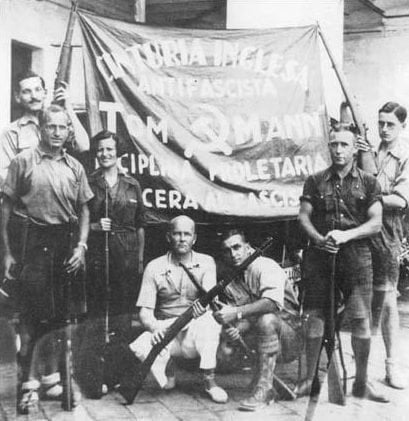From Jacobin
Defeat
Ibárruri was infuriated by the fall of Málaga in February 1937 — a defeat for which she held incompetent Socialist prime minister Francisco Largo Caballero largely responsible. She played an important role in the campaign to remove him, through both her speeches and private channels.
An opportunity arose after the infamous May Days, when the anti-Stalinist communists of the Workers’ Party of Marxist Unification (POUM) and the anarcho-syndicalist National Confederation of Labour (CNT) rebelled against the Republic in Barcelona. Ibárruri visited president Manuel Azaña to complain about Largo Caballero’s ineptitude, his timidity with regard to the CNT, and the pernicious influence of his personal entourage.
Largely under Communist pressure, on May 17, Largo Caballero was replaced by finance minister Dr Juan Negrín. Yet, this change came too late to help the Basque Country; in a devastating blow to Ibárruri, Bilbao fell on June 19. In an eloquent article, she expressed her pain — and the conviction that this was a consequence of Largo Caballero’s mistakes.
Desperately anxious about how the war was going in the north, she fervently supported the diversionary attacks on Brunete and then Belchite. In articles published in Mundo Obrero, she paid tribute to the heroic resistance in Asturias. But she also railed against the shortsightedness of the Western democracies, in failing to support the Republic:
We have appealed to the proletariat of the entire world to come to our aid. We have shouted until we were hoarse at the doors of the so-called democratic countries, telling them what our struggle meant for them; and they did not listen.
By summer, with PCE Secretary-General José Díaz profoundly ill, she carried out many of his functions. She worked day and night, constantly importuned by problems, papers to read and authorize, and visitors to receive. Given her intense commitment to the war effort, she was infuriated by the frequent pessimistic remarks made by defense minister Indalecio Prieto. Within a week of the loss of Teruel in February 1938, she launched a savage attack on him.
On March 16, with Azaña and Prieto inclined to seek international mediation, she led a mass demonstration to pressure the cabinet against this. She and most of the Left saw such a move as tantamount to surrender; they were determined to resist until, they hoped, the Western powers realized that their interests required them to support the Republic.

1936.
The entire event was stage-managed. As part of the orchestration of the event, Negrín left the cabinet meeting in order formally to receive Pasionaria. She presented him with the demonstration’s demands for commitment to continued resistance — with which he fully agreed.
But the following month, Franco’s forces reached the Mediterranean — splitting Republican Spain and cutting off Catalonia. In this context, she made a brutally frank report to the Central Committee on May 23, making no effort to minimize the gravity of the situation.
The military defeats that we have suffered in recent months have left us in such a state that we have to declare, without any kind of exaggeration, that, at this moment, the liberty and independence of our country is more directly and seriously threatened than ever before.
She went on to draw a bleak assessment of the international situation, of the difficulties likely to face the central zone and of the ongoing problem of defeatism. She ended with a rousing call for greater unity and discipline behind the program of Dr Negrín, as the basis for resistance. The audience was shaken by her message; yet, in the words of American reporter Vincent Sheean,
the genius of Dolores — her unquestionable genius as a speaker, the most remarkable I ever heard — worked upon them its customary miracle, and she had the whole audience cheering with enthusiasm when she finished.
During the Munich crisis of fall 1938, Negrín proposed the withdrawal of the International Brigades, in the hope that this might tip British and French sentiment in favor of the Republic. Although she understood the political reasons behind the decision, Pasionaria was devastated by its implications. She had always seen the presence of the brigaders as the ultimate symbol that the Spanish Republic did not have to face fascism alone. The official farewell parade was held in Barcelona on October 29. In the presence of many thousands of tearful, but cheering, Spaniards, Dolores Ibárruri wept as she gave an emotional and moving speech:
Comrades of the International Brigades! Political reasons, reasons of state, the good of that same cause for which you offered your blood with limitless generosity, send some of you back to your countries and some to forced exile. You can go with pride. You are history. You are legend. You are the heroic example of the solidarity and the universality of democracy. […] We will not forget you; and, when the olive tree of peace puts forth its leaves, entwined with the laurels of the Spanish Republic’s victory, come back! Come back to us and here those of you who have no homeland will find a homeland, those who are forced to live without friends will find friends, and all of you will find the affection and the gratitude of the entire Spanish people.
Leave a Reply
You must be logged in to post a comment.